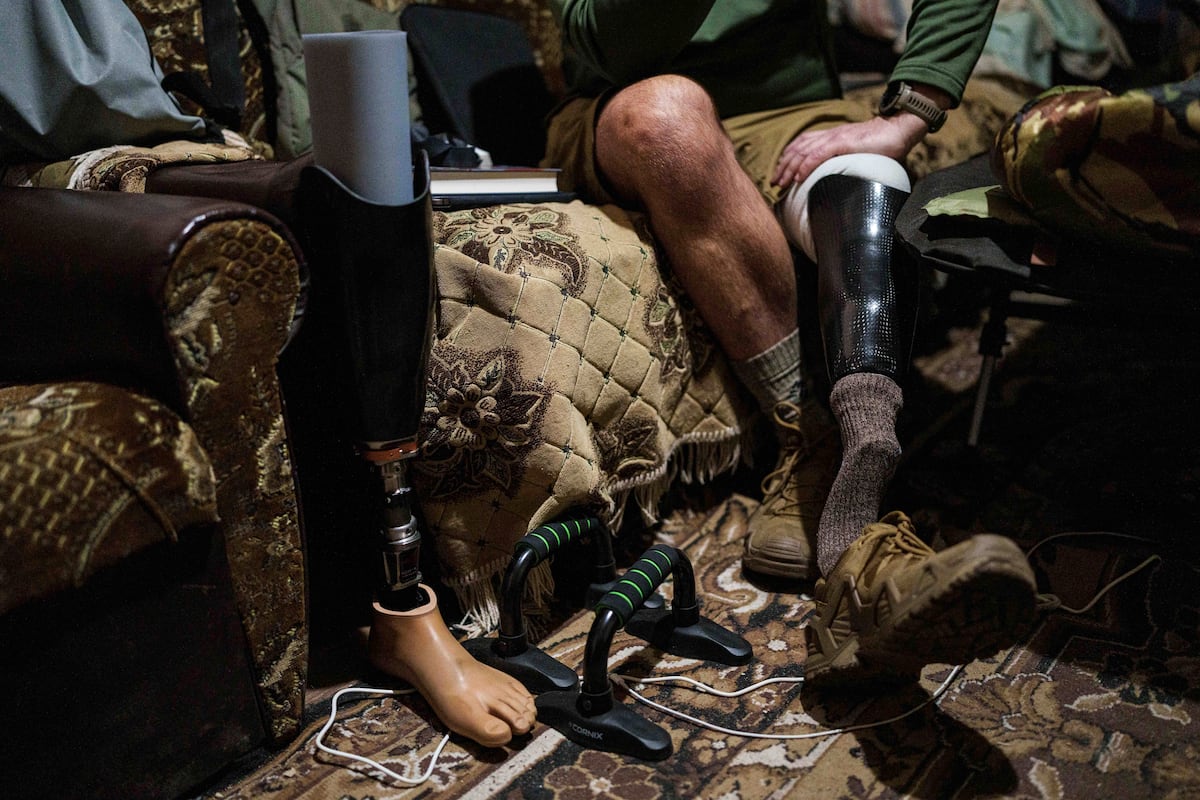White House officials won’t yet share publicly what they learned during Friday’s private summit between Donald Trump and Vladimir Putin in Alaska. That information is likely to trickle out this week after an urgent and highly unusual entourage of European leaders descends on Washington for talks with Trump and Ukrainian President Volodymir Zelenskyy.
But Trump alluded to some likely aspects, including conceding Crimea to Russia and blocking Ukraine’s path to membership in the NATO alliance, writing Sunday evening on social media.
Summit recap: After talking with Putin, Trump announced he’s dropped his demand for a ceasefire and insisted direct negotiations for a peace agreement were the best way forward. Trump’s main leverage—additional sanctions against Russia and its petroleum customers like India—would likely end peace negotiations and continue the war for at least 12 to 18 months, Secretary of State Marco Rubio said on “Face the Nation” from CBS News on Sunday.
Trump reax: “Because of what happened today, I think I don’t have to think about [further sanctions on Russia] now. I may have to think about it in two weeks or three weeks or something, but we don’t have to think about that right now,” the president told Sean Hannity of Fox shortly after his meeting with Putin.
Putin’s most consistently-reported demand is full control of Ukraine’s Donetsk oblast, analysts at the Institute for the Study of War write. However, ISW cautions, “Ukrainian forces would not be able to conduct a safe and orderly withdrawal from unoccupied Donetsk Oblast in accordance with Putin’s demand without a full ceasefire across the entire theater.” Thus, “A Ukrainian withdrawal would likely result in large force concentrations along major Ukrainian thoroughfares and defensive structures that Russian aviation, drones, and artillery would likely target upon the expiration of a ceasefire.”
Notable: Without a Ukrainian withdrawal, “Seizing the remainder of Donetsk Oblast would likely be a difficult and years-long effort for Russian forces rather than a quick effort as Putin likely aims to portray, as Russian forces remain unable to secure operationally significant advances or advance faster than foot pace,” ISW writes.
Also worth noting: Putin’s reported “offer of a Russian law forbidding a future invasion of Ukraine is not credible because Russia has already twice broken previous binding international commitments not to invade and because Putin has shown that he can freely change Russian law as he desires,” ISW warned Sunday.
Visiting Washington today: European Commission president Ursula von der Leyen, French president Emmanuel Macron, Italian prime minister Giorgia Meloni, German chancellor Friedrich Merz, NATO chief Mark Rutte, British prime minister Keir Starmer, and Finnish president Alexander Stubb.
Second opinions: All that transatlantic travel “suggests that something went very wrong in Alaska if this many European leaders are coming to Washington on short notice,” former Naval War College professor Tom Nichols wrote on social media.
No cards for Trump? “No wonder all of Trump’s negotiating deadlines for Russia have passed, to no effect, and no wonder the invitation to Anchorage produced no result,” Anne Applebaum writes for The Atlantic. “Trump, to use the language he once hurled at Zelensky, has no cards.”
View from London: “With Russia’s economy on the ropes, Trump remains bafflingly unwilling to apply the maximum economic pressure on Russia that would mean summits like those held yesterday are more likely to yield the success Donald Trump craves,” said Tom Keatinge, Director of the Centre for Finance and Security at the London-based Royal United Services Institute.
“Putin may have successfully neutralised the idea of a ceasefire by hinting at a broader deal he knows will take time to negotiate,” said RUSI’s Matthew Savill. “If Putin cannot bait Trump into a further round of bilateral strategic summits, he will be content if Trump grows tired of the whole thing and effectively walks away,” said RUSI’s Director of International Security Neil Melvin.
Washington reax: “Putin got everything he wanted: a photo op legitimizing his war crimes, no ceasefire, and no sanctions or new weapons for Ukraine,” said Democratic Sen. Chris Murphy of the Foreign Relations Committee.
Murphy’s SFR colleague Jeanne Shaheen of New Hampshire: “Trump promised to end this war on Day One and instead he has let Putin cross one red line after another with impunity. No deal is better than a bad deal,” Shaheen said in a statement. “Trump’s continued reluctance to hold Putin to account means that Ukrainians will continue to die, Putin continues to act without consequences and our deterrence against would-be aggressors in Beijing is weakened.”
Republican Sen. Lindsey Graham says the war could be over by Christmas. “If in fact there is a trilateral meeting between President Trump, President Zelensky and Putin, then I am cautiously optimistic that this war will end well before Christmas,” the South Carolina lawmaker mused this weekend. “If that meeting fails to materialize, I think President Trump may have to go all in to punish those who buy cheap Russian oil and gas, propping up Putin’s war machine,” he said.
Senate Armed Services Committee ranking member Jack Reed, D-Rhode Island: “Validating [Putin’s] illegal landgrab in Ukraine and legitimizing Russia’s invasion would be a bad precedent that sets the stage for future conflict. Instead of caving to Putin, the U.S. should join our allies in levying tough, targeted new sanctions on Russia to intensify the economic pressure…Trump must not abandon the Ukrainian people and cater to Russian aggressors, or it will only embolden America’s adversaries and invite more aggression.”
Latest from Ukraine: Russian strikes overnight killed seven Ukrainians in Kharkiv, “the youngest being a girl who is only a year and a half old, and dozens have been injured, including children,” President Zelenskyy said on social media Monday. Elsewhere “In Zaporizhzhia, missile strikes injured 20 people and killed three,” he added, calling the actions “a demonstrative and cynical Russian strike” because “They are aware that a meeting is taking place today in Washington that will address the end of the war.”
For the DC insider: There is a “Tiny White House Club Making Major National-Security Decisions,” veteran reporters Missy Ryan, Jonathan Lemire, Nancy Youssef, and Michael Scherer wrote Friday for The Atlantic. The “core” team includes Vice President JD Vance, Marco Rubio, and Susan Wiles, while “Stephen Miller plays a key role on issues related to homeland security,” and real estate billionaire Steve Witkoff watches issues affecting Russia and Israel. Meanwhile, “on military matters, the president pulls in [Pete] Hegseth and General Dan Caine, the chairman of the Joint Chiefs of Staff.”
The perks: “The more centralized setup allows Trump’s impulses—his disregard for historic alliances, his love of dealmaking, and his focus on perceived abuses of American largesse—to drive U.S. policy.”
The downside: “By discarding a process designed to surface different views and analyze moves from all sides, [Trump] has increased the risk of unintended consequences.” Read the rest (gift link), here.
Related reading:
Welcome to this Monday edition of The D Brief, a newsletter dedicated to developments affecting the future of U.S. national security, brought to you by Ben Watson with Bradley Peniston. Share your tips and feedback here. And if you’re not already subscribed, you can do that here. On this day in 1965, some 5,000 Marines assaulted a Viet Cong base in Operation Starlite, the U.S. military’s first large offensive action of the Vietnam War.
Trump 2.0
Update: The National Guard will carry weapons while deployed in the nation’s capital over the next several weeks, the Wall Street Journal reported Saturday, two days after the Army had announced the troops’ weapons would “remain in the armory” unless or until needed.
Rewind: Trump ordered the troops to Washington ostensibly to tame Washington’s allegedly out-of-control crime, according to Trump—though actual crime in the city is at its lowest point in decades.
Historian’s reax: “Under the guise of fighting crime, the administration has quite literally turned guns on the American people,” observed Heather Cox Richardson of Boston College, writing Sunday.
Sen. Chris Murphy, D-Connecticut: “Trump’s takeover of DC policing is just a stunt to distract people (and the press!) from his refusal to release the Epstein files and his upcoming massive health insurance premium hikes,” he told NBC on Sunday.
ICYMI: “This is not what the military of our country was designed to do, at all,” said one soldier assigned to protect federal agents in California two months ago, speaking to Shawn Hubler of the New York Times in mid-July. “The moral injuries of this operation, I think, will be enduring,” they predicted of the allegedly heavy-handed military response just before summer began.
Mapped: See where Trump’s forces are patrolling inside Washington, D.C., via this interactive from the Washington Post. Peter Baker of the New York Times writes, “Spoiler alert: They’re not where the crime is.”
New: The Republican governors of Ohio, West Virginia, and South Carolina say they’re sending hundreds more National Guard troops to D.C. “West Virginia said it was deploying 300 to 400 Guard troops, while South Carolina pledged 200 and Ohio says it will send 150 in the coming days, marking a significant escalation of the federal intervention,” the Associated Press reported, and called the deployments “a power play that the president has justified as an emergency response to crime and homelessness, even though city officials have noted that violent crime is lower than it was during Trump’s first term in office.”
- By the way: A combined 43 cities in those three states have higher rates of violent crime than Washington, D.C., as Philip Bump illustrated Saturday with data from the FBI.
Update: The man charged with assaulting a Border Patrol agent with a sandwich is an Air Force veteran, reports Military-dot-com. Sean Charles Dunn, 37, who was charged with a felony and arrested Wednesday after allegedly throwing a Subway sandwich was once an active-duty staff sergeant, a cyber transport systems specialist who entered the service in July 2006 and separated in May 2011. A bit more, here.
And in hoagie-hurler jokes: “Federal agent assaulted by sandwich admitted to Mayo Clinic.” (h/t @XBradTC)
ICE industrial complex update: The Washington Post obtained White House plans to double what is already expected to be “the largest immigrant detention system in the world” here in the U.S.—with a capacity of around 107,000 people with 125 new or expanded detention camps this calendar year. “The expansion is funded by an unprecedented $45 billion detention budget approved last month by Congress,” and largely spread across Texas, Louisiana, California and Georgia.
Notable: “Geo Group, ICE’s largest contractor and a company with close ties to the Trump administration, is in line to receive at least nine new or modified detention contracts with a total estimated value of over $500 million a year, the documents show…CoreCivic, the other largest private prison operator, would receive at least 12 contracts worth more than $500 million a year under the ICE plan—also roughly doubling that company’s annual revenue from ICE.”
Also: “The government is also planning to dramatically expand its capacity for detaining parents and children in what could amount to the nation’s largest family detention program in decades,” the Post adds. Read on, here.
Related reading:
Read the full article here








Leave a Reply